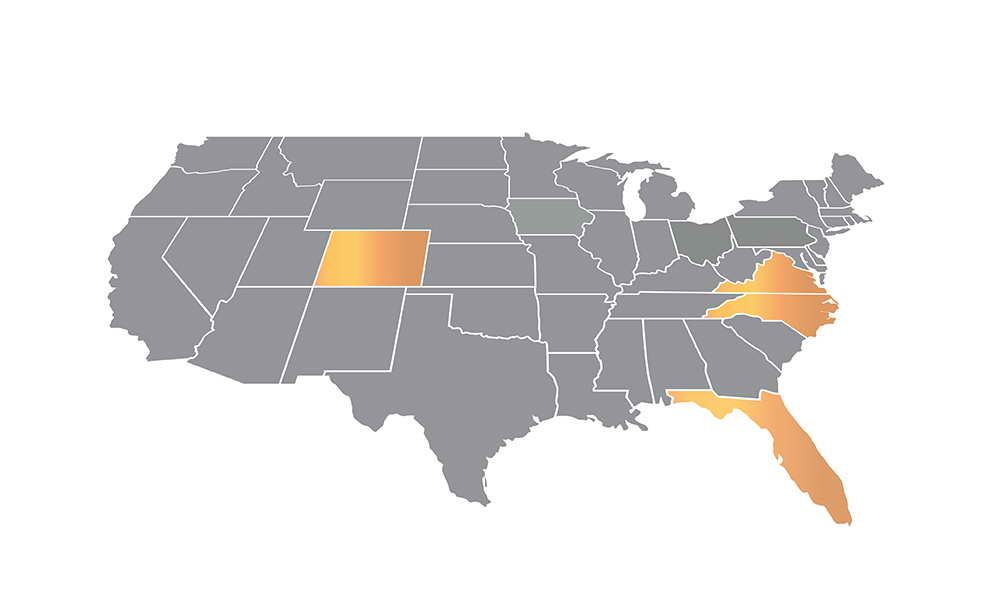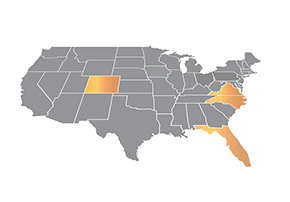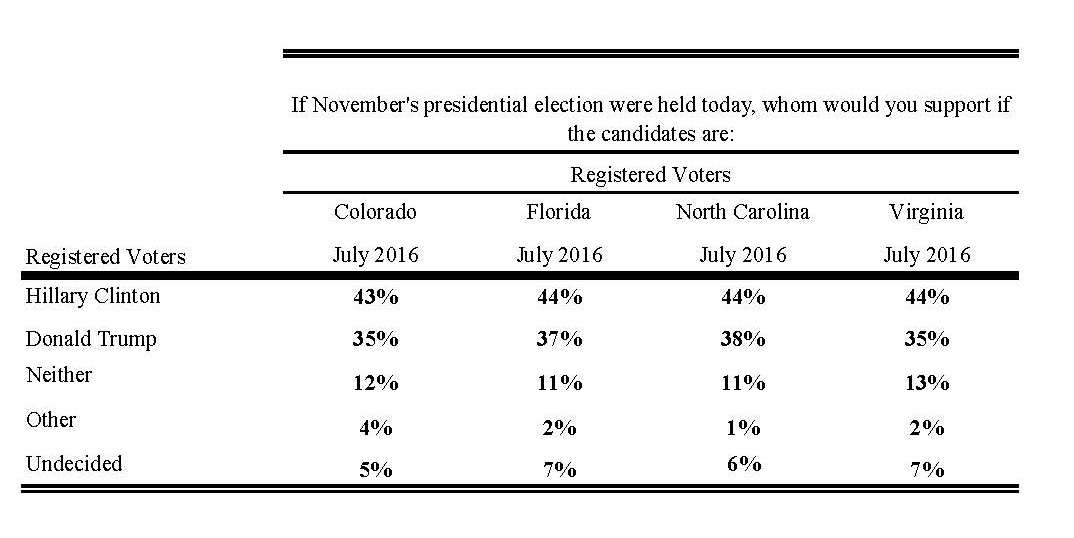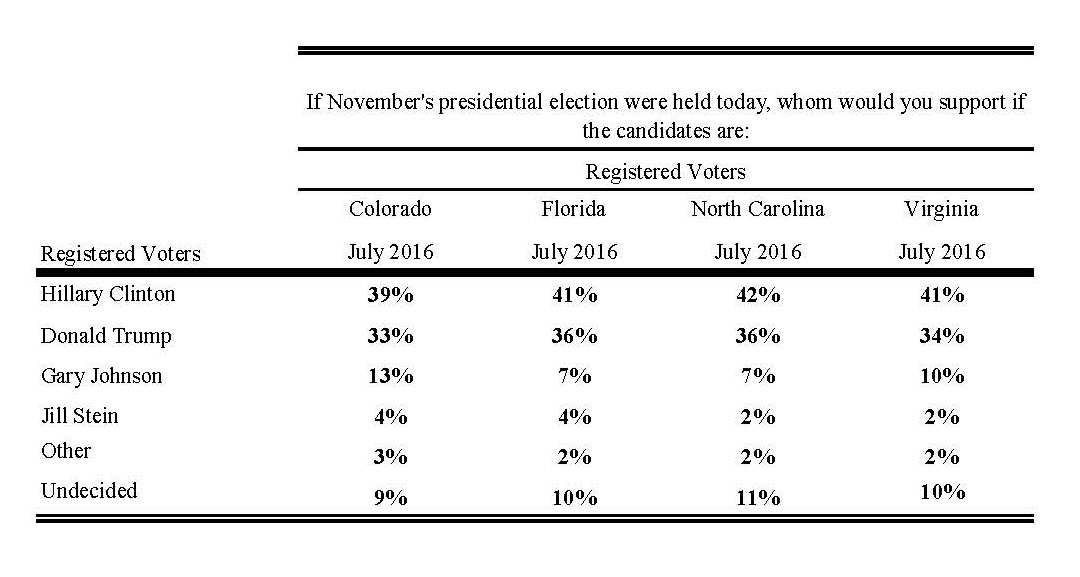July 15, 2016
7/15: Clinton Up in Colorado, Florida, North Carolina, and Virginia
NBC News/WSJ/Marist Poll
Presumptive Democratic nominee Hillary Clinton is ahead of presumptive Republican nominee Donald Trump by single digits in the battleground states of Colorado, Florida, North Carolina, and Virginia. With 9 electoral votes on the line in Colorado, 29 in Florida, 15 in North Carolina, and 13 at stake in Virginia, Clinton has the early edge. In 2008 and 2012, President Barack Obama carried these states with the exception of North Carolina. Obama lost North Carolina by 2 points in 2012.
In Colorado, Clinton, 43%, is ahead of Trump, 35%, among registered voters statewide. Among those who say they definitely plan to vote in November, Clinton’s advantage remains 8 points.
In Florida, 44% of registered voters support Clinton to 37% for Trump. When the NBC News/Wall Street Journal/Marist Poll last reported this question in March, Clinton received 49% of the statewide electorate to 41% for Trump. Among Florida’s registered voters who say they definitely plan to vote, three points currently separate Clinton and Trump.
In North Carolina, Clinton garners the support of 44% of registered voters compared with 38% for Trump. Clinton and Trump are separated by four points among those who report they definitely plan to vote in November.
In Virginia, Clinton, 44%, leads Trump, 35%, among registered voters statewide. Among those who say they will definitely go to the polls on Election Day, Clinton is up by 10 points.
In each of these four states, Clinton’s Democratic base is intact as is Trump’s support among Republicans. Although Clinton leads Trump by almost 20 points in Colorado among independent voters, independents in all four states have not coalesced behind either candidate. In fact, more than one in four independents in Florida and North Carolina say they support neither Clinton nor Trump, back another candidate, or are undecided. About one in three independents in Colorado and Virginia say the same.
A gender gap exists in Colorado, North Carolina, and Virginia. 49% of women in Colorado, 50% in North Carolina, and 52% of female voters in Virginia support Clinton while 42% of men in Colorado, 46% in North Carolina, and 41% of male voters in Virginia are for Trump. In Florida, Clinton, 45%, leads Trump, 35%, among women. Among Florida voters who are men, Clinton, 42%, and Trump, 39%, are closely matched.
In each of these four states, Trump leads Clinton by double digits among white voters without a college degree. In North Carolina, 56%, and Virginia, 54%, Trump receives majority support among these voters. In Florida and Colorado, Trump receives the backing of pluralities of white voters without a college degree, 47% and 44%, respectively. However, he underperforms what Mitt Romney received among these voters in 2012.
Among white voters with a college education, Clinton garners the support of pluralities in Colorado, 49%, and Virginia, 42%. Trump, 41%, and Clinton, 39%, are competitive among white voters with a college education in North Carolina. In Florida, Trump receives 44% to Clinton’s 39% among this group. Although Trump underperforms the Republican share from 2012, Clinton receives about the same support as Obama among these voters.
“With 66 electoral votes at stake in these four states, Donald Trump is playing catchup against Hillary Clinton,” says Dr. Lee M. Miringoff, Director of The Marist College Institute for Public Opinion. “The driving force behind voters’ choices is the negative impressions they have of both Trump and Clinton. Clinton’s single-digit lead in each of these states is due to her slight advantage in how voters perceive the two candidates.”
In a four-way contest with Gary Johnson, the Libertarian, and Jill Stein of the Green Party, little changes in these four states. Clinton retains her single-digit advantage over Trump.
Clinton and Trump are unpopular in each of the states polled, and their favorable scores are upside down. 59% of residents in Colorado, 56% of those in Florida, 58% in North Carolina, and 57% of adults in Virginia have a negative opinion of Clinton. Impressions of Trump aren’t any better. 68% of Colorado adults, 63% of Floridians, 61% of North Carolina residents, and 64% of those in Virginia have an unfavorable impression of Trump.
Turning to the contests for U.S. Senate, Democratic incumbent Michael Bennet, 53%, leads his Republican challenger Darryl Glenn, 38%, by 15 points among Colorado’s registered voters. In Florida, a hypothetical matchup between former presidential candidate and Republican Senator Marco Rubio and potential opponent Democrat Patrick Murphy, shows a close contest, 47% to 44%, among the statewide electorate. In North Carolina, incumbent Senator Richard Burr, 48%, leads Democrat Deborah Ross, 41%, among the North Carolina electorate.
In the race for governor in North Carolina, Democrat Roy Cooper, 49%, is competitive against Republican Governor Pat McCrory, 45%, among registered voters statewide.
The job performance of President Barack Obama is viewed more positively than negatively by residents in each of these states. In Colorado, 50% of adults approve of how the president is doing his job while 41% disapprove. In Florida, 49% of residents statewide approve of how President Obama is performing while 41% do not. Floridians were divided, 48% to 44%, in the March NBC News/Wall Street Journal/Marist Poll. In North Carolina, the president’s approval rating stands at 49% among residents statewide while his negative score is at 42%. In Virginia, 49% think the president is doing his job well while 43% disapprove.
Marist Poll Methodology for Colorado
Nature of the Sample for Colorado
Marist Poll Methodology for Florida
Nature of the Sample for Florida
Marist Poll Methodology for North Carolina
Nature of the Sample for North Carolina




